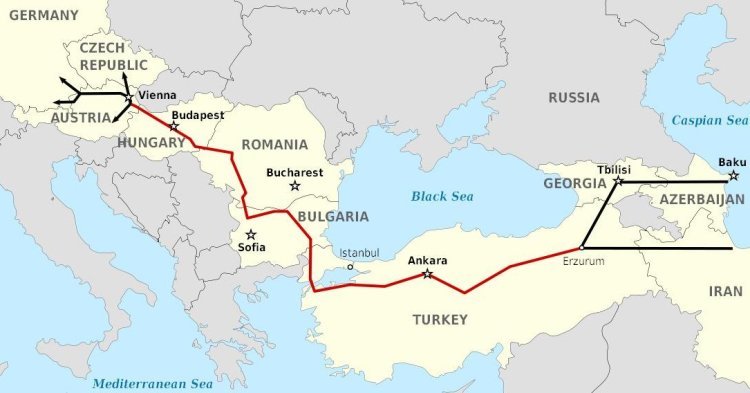On the 5th March 2010, the European Commission welcomed the formal ratification of the Nabucco Intergovernmental Agreement in Turkey. Günther Oettinger, European Commissioner responsible for Energy, said: “With this ratification Turkey has shown its commitment to Nabucco. We should all now move forward and make full use of the Nabucco intergovernmental agreement and quickly start the construction of the pipeline for its entire length from Eastern Turkey to Austria. Nabucco has been a political priority. Now it needs to become reality.”
Opera and gas go hand-in-hand
The 7.9 billion Euro pipeline is named after a Verdi opera whose subject is liberation from bondage. A bit symbolical one would say as the main aim is to lessen dependence on Russian gas...
Nabucco will be a 3,300km pipeline, which aims to deliver 31 billion cubic metres of gas per year in the EU’s Southern Corridor strategy. The 7.9 billion Euro pipeline is named after a Verdi opera whose subject is liberation from bondage. A bit symbolical one would say as the main aim is to lessen dependence on Russian gas (which in 2008 amounted to around 32% of total EU gas demand) by bringing gas up from the Caspian region onto an Austrian hub via Turkey and the Balkans. The pipeline’s shareholders are Austria’s OMV Gas&Power, Hungary’s MOL, Romania’s Transgaz, Bulgarian Energy Holding, Turkey’s BOTAS and Germany’s RWE each with equal share to the amount of 16.67 %. Construction of gas pipeline is planned to be launched in 2011, with the first supplies being received in 2014.
Problems since the beginning
The way of Nabucco has not been an easy one. The construction has been hurdled by financing, pricing and supplying and (of course) political problems. Preparations for the Nabucco project have been underway since 2002, but recently took on a somewhat positive note. On the 13th July 2009, Turkey, Bulgaria, Romania, Hungary and Austria signed an intergovernmental agreement confirming their support for the Nabucco project and agreeing on a single, stable legal framework to govern gas transit and the calculation of transit tariffs across all five countries. While the agreement does not include many details it provides the necessary legal certainty to conclude supply contracts.
Suppliers, anyone?
Last month Nabucco consortium launched a pre-qualification process as a starting phase for the procurement of long-lead items (pipes, bends and valves) needed for the construction of the gas transit pipeline. Not actually a step forward as a main unanswered question is finding reliable suppliers for the pipeline. At the moment Azerbaijan’s Shah Deniz is the only ready gas supplier. Despite the growing Russian interest in Azeri gas, Azerbaijan committed to supply 50% of its natural gas extracts. Last month Turkey and Azerbaijan agreed on a price for Azeri gas and its transit through Turkish territory in direction of Europe but didn’t officially seal the deal.
Turkmenistan – another potential gas supplier - which exports most of its gas to Russia and China – is in negotiations with the European Union for more gas, though doubts remain as to if its reserves can actually fill the pipe. The signing of an agreement with Nabucco shareholder RWE on gas supplies from Turkmenistan was postponed until the end of the year.
Supplies from Iraq are being considered, especially with the signed Memorandum of Understanding which aims strengthening strategic energy cooperation between the EU and Iraq in areas such as natural gas, energy security and renewables.
Another Middle Eastern country, Iran, has said that its vast natural gas reserves could help fill the pipeline and in the long term could be considered a potential suppler, though officials in Washington and the European Union have rejected the idea so far.
With all these uncertainties it remains unclear if the amount of supplies would bring Nabucco’s planned capacity to 31bcm/y. If Nabucco is to meet its stated goal of delivering first gas to Europe in 2014, it needs to secure gas through-put commitments in order to support its financing and construction plans. Especially with rival South Stream pipeline project (a proposed gas pipeline to transport Russian natural gas to the Black Sea to Bulgaria and farther to Austria and Italy) backed by Russia’s Gazprom securing any available gas production in the Caspian Region.
Money, it’s a gas!
Financing is another main unsolved problem. Last year the European Investment Bank confirmed its readiness to provide $2.25 billion for the project, amounting to 25% of the total cost while Nabucco’s partners are set to finance 30 % of the project. On the 4th March 2010, the European Commission allocated 1.5 billion Euros for projects aimed at improving the EU’s energy infrastructure. Nabucco received 200 million Euros of that money. The project consortium is also planning to apply for loans from international financial institutions.
Still a long way to go
It’s still early days to make any comments on the outcome of the project but one thing is for sure - 2010 will be a critical year for Nabucco.
It’s still early days to make any comments on the outcome of the project but one thing is for sure - 2010 will be a critical year for Nabucco. If it proves that in times of economic instability it can make significant progress, then most likely it will become reality. If it is to succeed though, it will need serious financial and political backing from the EU. It’s important for it to remain EU’s flagship project of energy policy because it will create a more coherent energy policy and establish important political relationships with potential supplier countries.


Follow the comments: |
|
